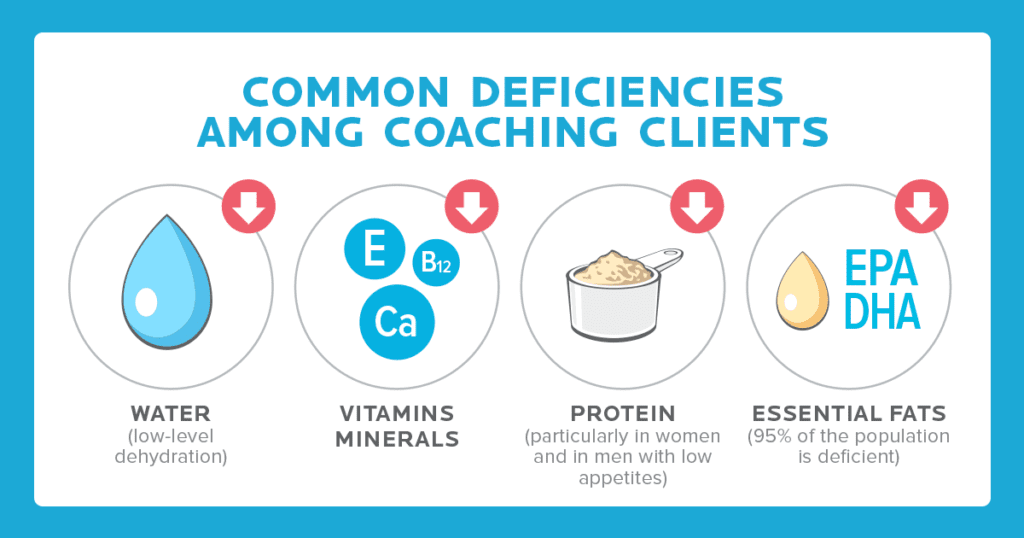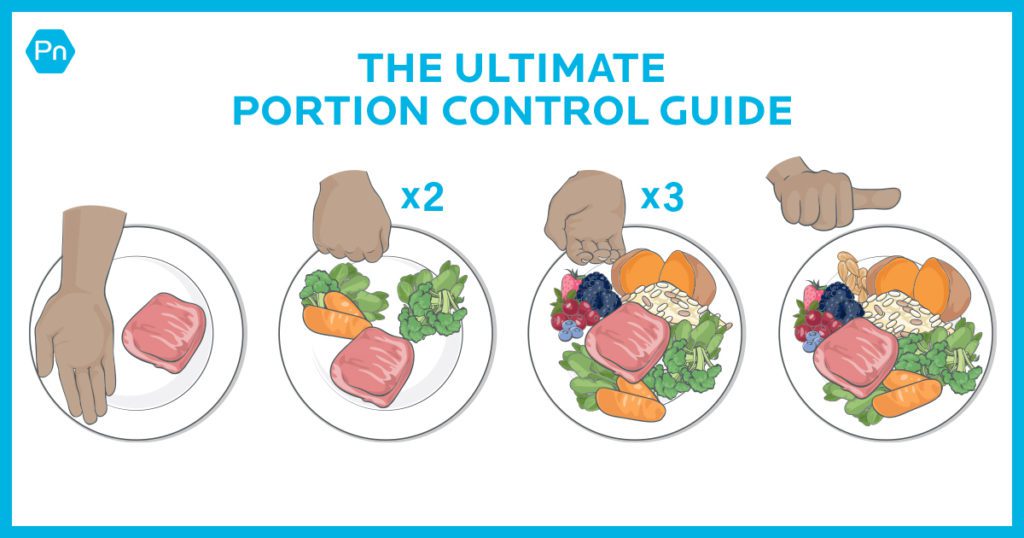It’s a hot debate: Can personal trainers, health coaches, and other non-RD professionals give nutrition advice to their clients? You’ll be surprised (and relieved) to hear: Yes, to a degree. Here’s exactly what you’re allowed to say, and why it’s important to say it.
- Want to listen instead of read? Download the audio recording here…
++++
Fitness is a competitive industry. It can also be confusing at times.
You might find yourself asking:
What credentials do I need to become a world-class coach and have a successful, fulfilling career?
How can I deliver truly life-changing results to my clients?
If you follow my work you already know my take: The best exercise program in the world won’t be effective if a client isn’t eating well.
In other words, to help a client transform their body, you have to address movement, lifestyle, and nutrition.
“But wait!” you say.
“Am I even allowed to give nutrition advice?”
I’ve been asked this question literally thousands of times.
Health and fitness pros desperately want to help clients eat, move, and live better©. And they want to know if it’s okay to talk about nutrition with clients.
They know that without proper nutrition, clients will struggle with weight, body composition, metabolism, and many of their health goals.
But people worry.
Some have been told they’re not qualified to talk about food with their clients — that it might even be illegal.
Here’s the truth:
Personal trainers/health coaches CAN talk to clients about what they eat.
And they’re allowed to make general suggestions about the kind of food that’s likely to support their clients’ goals.
But there are limits to what personal trainers, health coaches, and other non-Registered Dietician (RD) professionals can say about nutrition.
Perhaps even more importantly:
If you’re going to talk about nutrition, you really need to know what you’re talking about.
So let’s clear up the confusion.
In this article, I’m going to explain:
- What personal trainers, health coaches, and other non-RD fit pros can’t do when it comes to nutrition.
- What personal trainers, health coaches, and other non-RD fit pros can do when it comes to nutrition.
- Why it’s important to talk about nutrition in the first place.
These are the exact same parameters we teach in the Precision Nutrition Certification, an education program designed by a world-class team of MDs, PhDs, RDs, nutritionists, personal trainers, and a talented group of other very experienced, very qualified professionals.
We hope this article helps you. Regardless of what you do for a living and where you are in your career, it’s important to know this: Laws governing the terms and services a nutrition coaching professional can claim depend on education type/degree and licensing requirements, and vary by state/province. Please check your local laws, or contact a legal professional for help determining what you’re allowed to say and do.
First, a history lesson.
Before we get into the details, I want to tell you a story about a good friend of mine, Gray Cook, who created the Functional Movement Screen (FMS).
Years ago, Gray was one of the first people to bring movement screening, corrective exercise, and dynamic mobility work into fitness.
At that time, movement screening and dynamic mobility exercises were considered the realm of physical therapy only — and therefore outside the personal trainer’s scope of practice.
Then Gray started teaching these techniques to personal trainers.
Managers at gyms got angry. Trainers got nervous. Physical therapy organizations sent him cease-and-desist letters and lawsuit threats.
It all went by the wayside because, fundamentally, these practices are all about movement — and movement belongs in the gym.
Education won over fear and feudalism. Today fitness professionals routinely include movement screening, mobility work, and corrective exercises as part of their workouts with clients.
We may be on a similar path with personal trainers, strength coaches, and nutrition support.
Some good news: The fitness industry has begun treating clients as “whole people.”
The most educated and experienced coaches—the leaders—recognize that they can’t achieve the best results unless they coach the “whole person.”
Unless they deal with the stress someone is under, the sleep problems they’re having, and the common ways in which their diets are working against them, their workout programs will be far less effective.
Clients are also starting to expect nutrition advice as part of the package.
So the best professionals are now wading into the nutrition waters.
Yet if you’re feeling unsure about what you can (and can’t) say about food, you’re not alone. Lots of people feel this way.
And I think that’s a good thing.
It means you care about your career, you care about your clients, and you want to make sure you’re doing a good job — while doing the right thing.
My message for you:
You can (and should) talk about nutrition with clients — as long as you respect these guidelines and know one important thing…
What personal trainers, health coaches, and other non-RD fit pros CAN’T do when it comes to nutrition.
Let’s clear up what you are not allowed to say without having the RD credential.
Registered dietitians complete a four-year degree program and log hundreds of hours in a rigorous internship. They study physiology, anatomy, biochemistry, microbiology, and many other areas of science as part of their coursework, and typically train in a special area, like pediatric or geriatric nutrition.
Earning their degree, and passing a licensure exam, qualifies RDs to offer medical nutritional therapy (MNT) — treating medical conditions (such as diabetes) through a tailored diet and close monitoring.
Often, registered dietitians spend their careers working with patients in hospitals or other clinical settings.
Therefore, if you’re not a registered dietitian or doctor, you CANNOT legally:
- prescribe diets or supplements to treat medical and clinical conditions;
- prescribe diets to treat symptoms of medical and clinical conditions; nor
- diagnose medical conditions.
So if you’re a personal trainer, health coach, or strength coach and a client comes asking what diet to follow to treat their diabetes — that’s outside your scope of practice. It’s MNT and therefore illegal unless you’re an RD.
Another scenario: Let’s say you’re a fitness professional and you have an obese client. You’re not allowed to “prescribe a diet” to “treat” their obesity. That’s MNT and reserved for licensed dietitians or medical professionals. (But, you can still work with and coach this client. See how below.)
In the end, it’s best (unless you’re an RD) to avoid “treating,” “prescribing,” and “diagnosing.” (Note: In some states, giving someone a meal plan is considered “prescribing”; Precision Nutrition-style “behavior-based” approaches are not.)
What personal trainers, health coaches, and other non-RD fit pros CAN do when it comes to nutrition.
Each state or province has different rules and regulations regarding what you can call yourself, what kind of advice you can give, etc.
However, generally, as a personal trainer, health coach, or strength coach, if you’re knowledgeable about nutrition then you can talk to otherwise healthy clients about eating, moving, and living better — so, yes, you can talk about what food to eat.
You can:
- encourage clients to eat lean protein and nutrient-rich vegetables;
- educate clients about the benefits of protein, healthy fats, and other macronutrients;
- offer clients recipes or demonstrate food prep skills;
- let clients know about evidence-based nutritional supplements that might augment their healthy lifestyle;
- educate them about the principles of good nutrition and provide them with behavior-based coaching to improve their eating habits;
- help them choose the right foods to eat before and after workouts;
- suggest that clients drink water to stay hydrated;
- share resources from recognized nutrition organizations such as The Academy of Nutrition and Dietetics, the American Heart Association, and Precision Nutrition; and
- present nutritional information in an accessible, down-to-earth way that makes sense to clients—that engages them rather than makes their eyes glaze over.
As you can see, you’re not diagnosing health problems nor prescribing nutritional interventions to treat diseases or their symptoms.
In other words, how you communicate with your clients about nutrition matters. Let’s compare with a few examples:
- You CANNOT “prescribe a diet” to “treat someone’s obesity.”
- You CAN “share a few nutrition ideas” to “support their healthy lifestyle.”
- You CANNOT “diagnose diabetes” and give a “manage blood sugar” diet.
- You CAN “share a recipe” for a tasty, high-fiber, slow-digesting meal.
- You CANNOT “recommend fish oil” for “treating arthritic knee pain.”
- You CAN “share evidence” that “fish oil supports healthy movement.”
See the difference?
In most places, you’re allowed to talk generally about nutrition for supporting broad performance, health, and wellbeing goals.
Notice the quotation marks above: Legal regulations are highly dependent on the words you choose. So make sure to choose yours—in marketing and advertisement as well as in client discussions—carefully.
Also—and this is important—do your due diligence first. Don’t guess. Check your state or provincial guidelines to be sure. And if truly in doubt, seek legal counsel for clarity on the rules and regulations for where you live and work.
Important caveat: You have to know nutrition to talk about nutrition.
You wouldn’t tell someone how to fix their car if you know nothing about fixing cars, right? The same is true for nutrition.
While you’re technically allowed to talk about healthy eating with clients, you shouldn’t unless you know what you’re talking about.
Credible, serious professionals need to get the right training and education before discussing nutrition with clients.
And credible, serious professionals have a realistic and accurate idea of how much they know. (Or don’t know.) They can test their knowledge against objective, rigorous, evidence-based standards (such as the requirements of a nutrition certification), rather than assuming they have all the answers.
What kind of education is available for health and fitness professionals?
In most countries, the term “dietician” is legally reserved for people who’ve completed the stringent degree program I described above.
At the same time, the term “nutritionist” is much broader and loosely defined — it can include everything from someone with PhD-level training to a person who only completed a short continuing education course.
While there isn’t one particular certification you need to talk about nutrition as a health or fitness pro, it’s best to seek out a rigorous, well-respected program that covers nutrition science, biochemistry, physiology, anatomy, and other related topics.
I also encourage you to look for training programs that are client-focused, based on the “whole person” approach to a healthy lifestyle, and continuously reviewed and updated per the latest findings with real clients and in peer-reviewed research.
Even better, I recommend finding a program that also includes coaching techniques and change psychology. Because understanding the science of nutrition won’t get you very far if you lack the foundational coaching skills needed to communicate and guide your clients toward change behaviors that’ll actually stick.
Why it’s important to talk about nutrition in the first place.
In the last two sections we talked about what health and fitness professionals can (and can’t) do when it comes to nutrition.
And, while some people like to make the rules sound tricky and complicated, discussions like this often distract from the most important message:
We must do something.
I’ve been involved in health and fitness for 25 years, and substantive, proven nutrition coaching is a missing component in the health, fitness, strength, and rehab fields.
Without effective nutrition coaching skills, professionals struggle (and sometimes fail) to help clients achieve their goals.
Clients get frustrated and quit, and their health stagnates or gets worse. The coaches lose their passion — and then they start to think about quitting too.
With effective nutrition coaching skills, professionals feel confident and competent.
They can answer clients’ questions clearly and effectively. They can demonstrate expertise and an authoritative command of the field.
They can guide their clients towards real, noticeable, lasting change, rather than juggling “quick fixes.”
They can inspire their clients to change, rather than pushing, “convincing,” or exhausting themselves trying to “motivate” people.
Most importantly:
They can really help their clients.
Wouldn’t your clients be better off for getting movement, food, and lifestyle advice—advice that considers the broader context of their lives—from one knowledgeable, trusted source?
In working with over 150,000 clients during the last 15 years I’ve learned that including nutrition in your practice can make you five times as effective.
That means:
- 25 pounds lost, instead of 5.
- 20 points knocked off the blood pressure score, instead of 4.
- 5 inches off someone’s waist, instead of 1.
Five times more client commitment, confidence, motivation, retention, and satisfaction… with five times less effort from you.
Every client is different, with their own unique needs. But with the proper education and coaching skills, you can feel confident in talking about nutrition with them.
You can offer suggestions you know are safe and correct—so your clients get the care they need.
In the end, the question of whether (or not) you should give nutrition advice is just part of a much larger, much more important question for the industry:
Will we start looking at clients as whole people whose health and wellbeing depends on movement, proper nutrition, stress management, better sleep, and a deeper connection to their community?
Or:
Will we continue to take clients through workouts while ignoring all the other things that can make them happy, healthy, and whole?
I think the health and fitness industry is pointing toward the former. And this is the context in which nutrition advice is the most meaningful and effective.
What to do next:
Some tips from Precision Nutrition
If you’re ready for the nutrition knowledge and coaching strategies to take your career to the next level, start here.
1. Understand what you legally can and cannot say.
Remember: Only registered dietitians and medical doctors can provide medical nutritional therapy — or prescribe nutritional interventions to treat medical or clinical illness.
So unless you have one or both of those credentials, don’t try to use nutrition advice to diagnose or cure a health problem, relieve disease symptoms, or answer clients’ questions about any of the above.
In addition, laws governing the terms and services a nutrition coaching professional can claim depend on education type/degree and licensing requirements, and vary by state/province. Please check your local laws, or contact a legal professional for help determining what you’re allowed to say and do.
So do your due diligence first. Check your state or provincial guidelines to be sure. And if truly in doubt, seek legal counsel for clarity on the rules and regulations for where you live and work.
2. Decide what you want to be able to say, and why.
There are many possible paths in nutrition education.
- Degree programs allow you to become a registered dietitian, teacher, or lecturer.
- General nutrition courses (quality ones) are for health professionals who want to be able to talk to clients about nutrition basics.
- Fitness nutrition certifications are for personal trainers and athletic coaches who want to offer reliable nutrition advice to improve client results.
3. Choose how you’ll study.
Some questions to ask when you’re looking at programs:
- Do I complete the course at home or at an institution?
- Are there specific times when I’ll have to study?
- Is there a deadline, or can I complete the course at my own pace?
- Do I get to practice real-life client scenarios?
4. Weave in coaching and psychology.
Having a handle on change psychology is crucial to helping your clients with nutrition. What they eat is deeply ingrained, and changing what they eat can be a slow, difficult process… unless you understand what makes your clients “tick.”
5. Find a mentor.
If you want to keep growing and developing a sustainable career and coaching business, you need to find the right mentor.
A good mentor will provide the perspective you don’t (and can’t) have yet to keep you confident and inspired, even when the going gets tough.
If you’re a coach, or you want to be…
You can help people build sustainable nutrition and lifestyle habits that will significantly improve their physical and mental health—while you make a great living doing what you love. We'll show you how.
If you’d like to learn more, consider the PN Level 1 Nutrition Coaching Certification. (You can enroll now at a big discount.)




Share